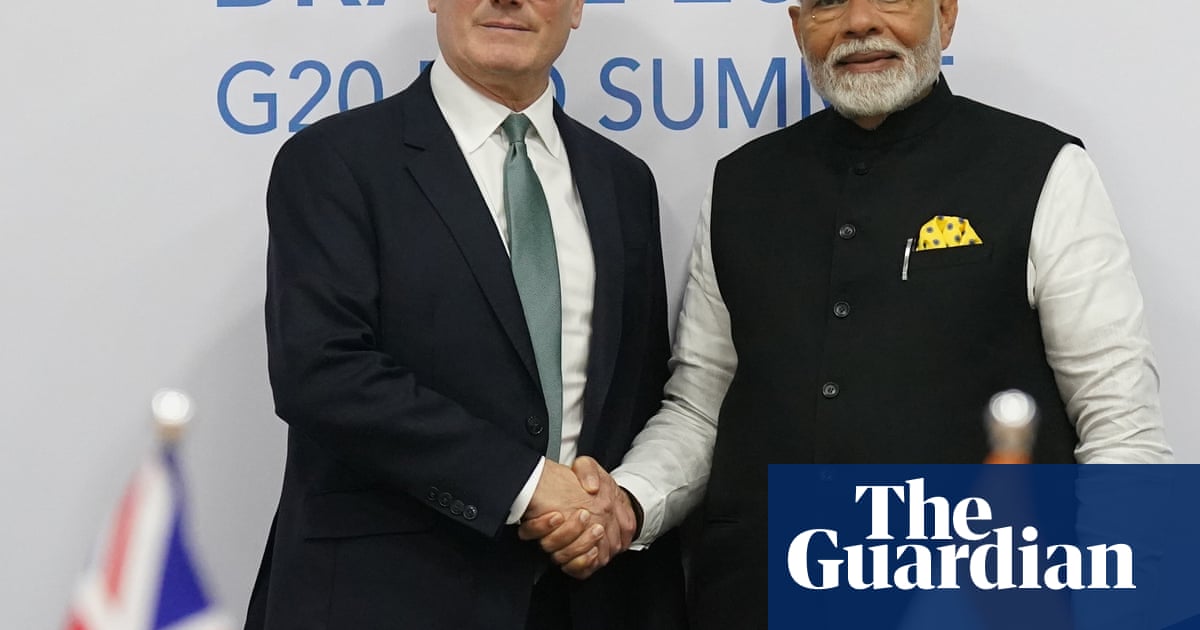It is not exactly the deepest and most comprehensive trade deal the UK has ever entered, but the timing of the announcement that Keir Starmer has clinched afree trade deal with Indiacould not be more fortunate.
Over the weekend, the US president, Donald Trump, hinted he was on the verge of announcing his first trade deal, prompting speculation it could be with Japan, South Korea orIndia.
Now Starmer has beaten him to it.
The world’s biggest economic blocs are engaged in a complex dating game. Both the EU and UK are hoping to charm the US into a deal before it potentially strikes a deal with China, which would put the EU and UK into second-order negotiations.
“This is welcome news and a coded reminder to Donald Trump that not all UK eggs are in the US basket,” said Mij Rahman, managing director of the Eurasia Group political consultancy.
“The real test for Keir Starmer will be how far he can dismantle the trade friction with the UK’s biggest trading partner – the EU. That will require a bolder approach to the reset than we have seen so far,” he added.
The Indian president, Narendra Modi, describedthe dealas an “historic milestone”, while the UK’s Labour government described it as “the biggest and most economically significant bilateral trade deal the UK has done since leaving the EU”, the kind of bragging rights a post-Brexit Conservative government only dreamed of.
The deal will reduce tariffs on 90% of British goods currently attracting import taxes in India, with levies on British whisky and gin slashed from 150% to 75%, before reducing to 40% by the 10th year of the deal.Tariffson cars will be reduced from 100% to 10% in a quota system.
Drinks company Diageo was delighted, with its chief executive, Debra Crew, describing the deal as a “huge achievement” that “will be transformational for Scotch and Scotland”.
It will also open important markets such as aerospace, salmon, lamb, medical devices, electrical machinery, soft drinks, chocolate and biscuits.
“The UK government may have gone for speed rather than substance to get a deal over the line in Trump-world. Negotiations with India have dragged on for years and stalled over immigration, which is not covered by this deal,” said Rahman. Legal services are not included either.
In total, the deal is expected to increase bilateral trade between the UK and India – currently worth about £40bn – by £25.5bn a year. This is a fraction of the near £315bn trade between the UK and the US, but it is seen as a good starting point rather than the finished product.
“This is a less ambitious deal than the last government hoped for, but that just reflects what was realistically available with India. As a step forward this makes sense, though not economically transformational,” said David Henig, UK director of the European Centre for International Political Economy.
He said the UK could have tried to hold out for a bigger deal, but there was “little point … as it wasn’t going to happen anyway”.
Sign up toBusiness Today
Get set for the working day – we'll point you to all the business news and analysis you need every morning
after newsletter promotion
In India, economist Mihir Sharma said the small print, which was not yet available, was what mattered.
Trade talks with India have in the past broken down over demands for more UK visa rights for Indian students and professionals, something that caused tension in previoustalks with Theresa May in 2016.
Sharma said this deal “looks like a win for Starmer – India has made some pretty big concessions that it has not yet made to other countries”. Extra visas are limited to just 1,800 a year for yogis, musicians and chefs. In addition, Indian workers temporarily living in the UK – and moved there by their company – will not have to pay national insurance contributions for three years.
The deal has its genesis in Rishi Sunak’s Conservative government, which opened talks with India in January 2022 with an ambitious target of agreement in 32 chapters.
But legal and financial services have been omitted in what is by and large a tariff deal, while there is no mention of the bilateral investment treaty currently under negotiation.
Miles Celic, chief executive of financial service body TheCityUK, welcomed the deal but said he was awaiting the “scope and details” as well as any hint of the “prospects for any future opportunities for new openings of trade in financial and related professional services, for which we have long advocated.”
